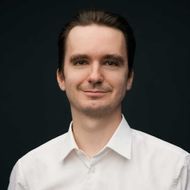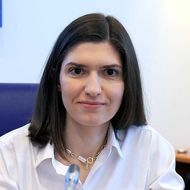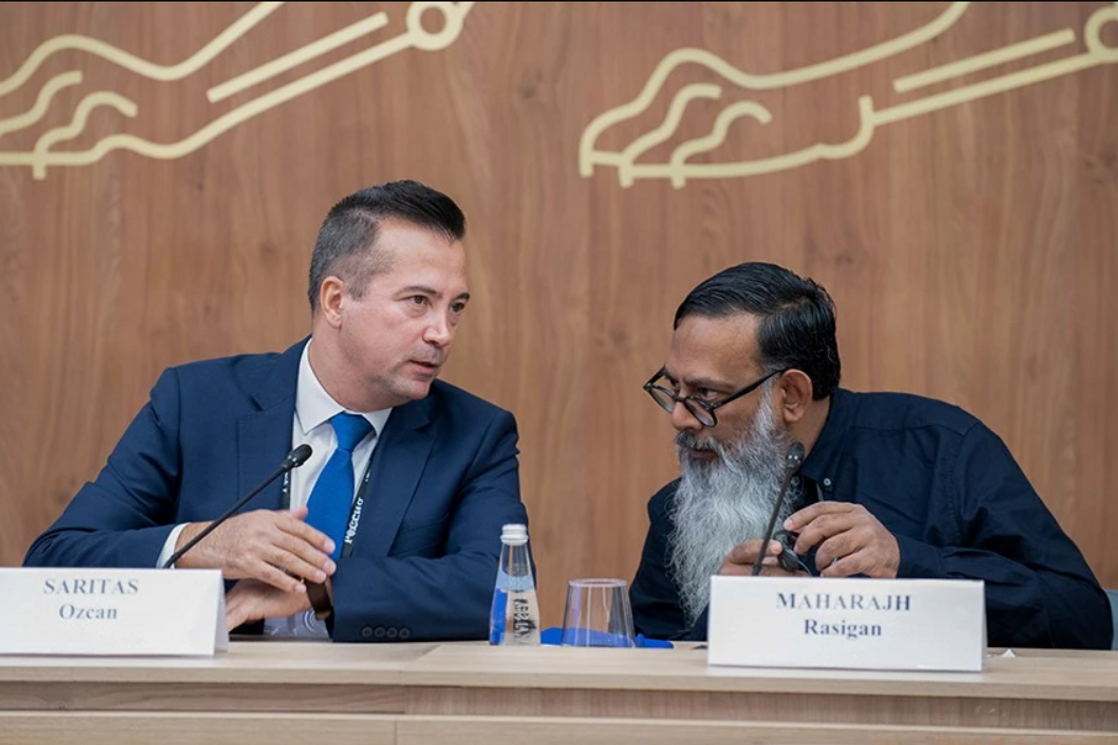'We Are Not Trying to Guess the Future—We Are Creating It': HSE University Experts Discuss 21st-Century Trends and Scenarios

Experts from HSE University participated in the II International Symposium 'Inventing the Future.' During the panel discussion 'Horizons of the Future: Trends, Challenges, and Scenarios,' organised by the HSE Institute for Statistical Studies and Economics of Knowledge (ISSEK), researchers explored the role of foresight and big data analysis in shaping visions of the future and identifying global megatrends that will drive the world’s development in the coming decades.
Opening the session, moderator Alexander Chulok, Director of the Centre for Science and Technology Foresight at ISSEK, highlighted the growing importance of the science and technology agenda in Russia and the need to shape the future using modern analytical tools. He noted that foresight today is evolving from a simple forecasting instrument into a comprehensive decision-making system. 'We are not trying to guess the future,' he emphasised. 'We are creating it using rigorous analytical methods, from econometrics to big data.'
To this end, HSE University employs its own set of analytical tools integrated into the iFORA system, which contains over 850 million documents and enables the mapping of global trends. 'We are used to hearing about "top 10 trends," but the reality is far more complex: there are hundreds of trends, and none of them exist in isolation. The challenge is to learn to identify their interconnections and build development scenarios,' the expert explained.

Among the key areas, Alexander Chulok highlighted bioeconomics, the development of smart cities, the markets of products for the elderly, and the issue of antibiotic resistance—'the most serious challenge, one which is already shaping new markets and technologies.'
He also emphasised the need to develop positive future scenarios: 'It is important to understand what kind of future we want to build. As the world becomes increasingly complex, people must remain at its centre.'
Konstantin Vishnevskiy, Director of the Centre for Strategic Analytics and Big Data at HSE ISSEK, provided more details about the capabilities of the iFORA system, mentioning that the platform integrates more than 20 machine learning models and is used in 150 projects worldwide—from Russia to South Africa.

Konstantin Vishnevskiy
'iFORA is a construction kit for researchers. It helps identify emerging trends, assess the technological maturity of various fields, and forecast market development,' the speaker said. 'AI used to be our assistant, but it is now becoming a full-fledged partner in data analysis.'
As an example, he spoke about the development of technologies based on perovskite, a mineral discovered in the Urals over a century ago, which became key to efficient solar panels in the 2010s. iFORA’s analysis revealed its potential well before the boom, detecting a surge in publications and patents. Today, this mineral has led to the establishment of international laboratories, including a joint Russian–Chinese research project.
He also emphasised that big data analysis makes it possible to identify not only the 'stars of the future,' but also wildcards—weak signals that can dramatically reshape the technological landscape. 'We must be prepared for the unpredictable. The future is always non-linear, and foresight helps minimise risks while preserving opportunities,' Vishnevskiy added.

Yulia Milshina
Wildcards were the focus of another presentation in which Yulia Milshina, Deputy Director of the International Research and Educational Foresight Centre at HSE University, described wildcards as low-probability events with a potentially enormous impact if they occur. She noted the rapid growth of interest in this topic within the scientific community in recent years. 'Wildcard events are characterised by low probability, significant consequences, difficulty of detection, and their challenge to established mental models. They transform the landscape of trends and create cascading risks, as seen with COVID-19, which evolved from a health crisis into a global shock,' the expert explained.
She emphasised that the role of foresight is not only to analyse patterns but also to anticipate the unexpected. HSE University is developing methods for early detection of weak signals and events that could become pivotal. 'We are creating tools that help us identify where the likelihood of change is greatest. In this sense, wildcards are not chaos but a space of possibilities. It is often from such subtle factors that breakthroughs emerge,' Milshina said.
She presented a methodology for identifying wildcards that combines advanced quantitative approaches using the iFORA system with sophisticated qualitative (expert) methods, including surveys, foresight sessions, interviews, and more. She also discussed some of the most effective ways to visualise these events, such as radar charts and trend maps. In recent years, HSE University has developed a comprehensive taxonomy of wildcard events, along with a database—the first of its kind in Russia—containing 350 such events, which is continuously updated and expanded. The database provides detailed analysis and classification of wildcards, including AI as a citizen, parameterised digital twins for personalised medical treatment, a shift to continuous biometric surveillance, AI-driven justice and dispute resolution, and others.
The expert stressed, however, that crises can open windows for innovation and international cooperation, such as combating bacterial resistance through pathogen monitoring and the development of new antibiotics. Addressing uncertainty also requires an interdisciplinary approach: 'The future is not just a scenario; it is a collective effort where data, science, and human imagination come together.'
She argued that the complexity of the world demands a shift from reactive measures to proactively shaping the future. 'We need to build resilience to shocks. The future is full of promise, despite the threats,' Milshina said.

Foreign experts also joined the discussion. Ozcan Saritas, Director of Future Foresight at RIT Dubai and Editor-in-Chief of Foresight (Turkey), described the future as a roller coaster of opportunities and threats—from space exploration and the quest for immortality to AI-driven reality distortion and a threefold increase in workload across the physical, digital, and space realms. He presented scenarios for 2050, ranging from sustainable development and international collaboration to resource depletion, emphasising the importance of ethical AI governance. 'A safe future is one in which machines are intelligent, but decisions are made by humans,' Saritas said.
Taimur Fahad Khan, Senior Research Fellow at the Institute of Strategic Studies Islamabad (Pakistan), focused on the megatrends of multipolarity, urbanisation, and energy transition, highlighting the risks of fragmentation and the need for collaboration to transform these risks into opportunities.

Rasigan Maharajh, Chief Director at Tshwane University of Technology and Elected Member of the Academy of Science of South Africa, stressed the role of the Global South in shaping a future where technology enhances security and multipolarity underpins a stable world order. He highlighted the importance of a solidarity-based approach to addressing climate change and social inequality: 'We live in an era of polycrisis. Only collective action—at the level of BRICS and other institutions—will enable us to meet these challenges.'
Summing up the session, Alexander Chulok emphasised that threats represent untapped opportunities, and that technology is not an end in itself, but a tool for shaping a comfortable and humane future. 'The countries that are first to ride the waves of emerging technologies—artificial intelligence, bioengineering, and human enhancement—will become the leaders of the next era. But it is important to remember that the future is not about technology; it is about the people who create it,' Alexander Chulok concluded.
He encouraged the participants to create personal development roadmaps: 'Engaging with the future should become a routine, just like practicing a sport.'
The Expert Programme of the symposium opened with a panel discussion titled 'Social Forecasting: Trends and Challenges.' Alexander Sokolov, Deputy Director of ISSEK, Director of the Foresight Centre at HSE University, and Head of the UNESCO Chair on Future Studies, discussed some key technological trends. Dmitry Trenin, Director of the Institute for World Military Economy and Strategy at the HSE Faculty of World Economy and International Affairs, also participated in the discussion.
Valentin Bianki, Leading Expert at the HSE Centre for African Studies, served as moderator of the discussion 'Russia and Africa in 2063.'
Pierre-Christian Brochet, Curator of the Contemporary Art programme at the HSE School of Design, shared his perspective on the challenges of art management during the panel discussion 'Cultural Institutions of the Future.'
Elena Ermakovishna, Head of the LongFashionWeekend Ural Project and Lecturer at the HSE School of Design, contributed to the discussion on themes and images bringing together Russia and the Global South.
Ilya Bannikov, Curator of the Art Direction for Cultural Institutions programme at the HSE School of Design in St Petersburg, presented at the session 'Design Today—Future Tomorrow.'
See also:
Global AI Trends Discussed at International Foresight Workshop at HSE University
At an international foresight workshop on artificial intelligence held at HSE University, Russian and foreign scholars discussed the trends and challenges arising from the rapid development of AI.
‘In the Next 20 Years, We Will Stop Aging’
The 25th Yasin (April) International Academic Conference on Economic and Social Development brought together leading Russian and Western scientists. Among the guests was Jose Luis Cordeiro, PhD, international fellow of the World Academy of Art and Science, Chair of the Millennium Project's Venezuela node, former professor at MIPT and HSE University, and author of The Death of Death.
‘The World Is Becoming More Complex and Less Predictable’: What Scientists Say about the Future
The future is now more difficult for researchers to forecast, and events that are hard to predict are playing an increasingly significant role. But there is good news too: scientists are confident that humanity will adapt to any changes. This was the focus of discussion at the International Symposium ‘Foresight in a Rapidly Changing World,’ which took place as part of the 25th Yasin (April) International Academic Conference.
HSE Foresight Centre's Work Praised by United Nations
The HSE Foresight Centre has been featured in a report by the United Nations Secretary-General as a successful example of a centralised approach to technology foresight. The document was prepared for the twenty-eighth session of the Commission on Science and Technology for Development, which is the United Nations’ focal point for technology foresight and technology assessment.
Director of the HSE International Research and Educational Foresight Centre Participates in UN Commission Meeting in Geneva
An intersessional meeting of the UN Commission on Science and Technology for Development took place on October 21–22, 2024, at the Palace of Nations in Geneva, Switzerland. ProfessorAlexander Sokolov presented new methods of scientific forecasting in his report titled ‘Science and Technology Foresight: Responding to New Agenda.’
‘Geographical Distance No Longer a Problem’: ISSEK Fosters Cooperation with Think Tanks in BRICS Countries
In September, the HSE Institute for Statistical Studies and Economics of Knowledge hosted an international working meeting with representatives from Brazilian, Egyptian, and Indian think tanks. The participants discussed opportunities for cooperation, including joint surveys, comparative studies, databases, and publications on foresight, technology, and innovation. It was also decided to draft a multilateral agreement to establish the BRICS Foresight Association.
‘An STI-Accelerated and Informed Future is Possible’
The Twelfth International Academic Conference ‘Foresight and Science, Technology and Innovation Policy’ is kicking off at HSE University on November 22. Alexander Sokolov, chair of the organising committee, talked to the HSE News Service about the evolution of the foresight agenda. Two of the conference speakers, Ibon Zugasti from Spain and Mlungisi Cele from South Africa, shared some highlights of their research.
UNESCO Chair on Future Studies Opens at HSE University
In 2022, a HSE University department joined the ranks of UNESCO Futures Literacy Chairs. This builds on the work of the ISSEK International Research and Educational Foresight Centre, and the activity of the Human Capital Multidisciplinary Research Centre. Professor Alexander Sokolov, head of the new department, Director of the International Research and Educational Foresight Centre, and Deputy Director of HSE ISSEK, spoke about the establishment, aims and objectives of the UNESCO Chair on Future Studies.
‘I Can’t Think of a Better Time for Young Researchers to Work in Foresight’
Foresight and STI Policy are among the symposium topics of the XXIII Yasin International Academic Conference. How has foresight developed in Canada? How did academic life change during the pandemic? What can early-career foresight researchers expect? The HSE News Service discussed these questions with Jonathan Calof, one of the symposium’s speakers.
HSE University Shapes Global Chain of Foresight
The COVID-19 pandemic has demonstrated our swift adaptation to big challenges and strengthened cooperation ties between researchers, politicians, and entrepreneurs on national and global levels. The accumulated life and goal setting practices in the new reality will be discussed on October 15–26, 2021 by participants of the XI International Academic Conference ‘Foresight and Science, Technology and Innovation Policy’ organised by the Institute for Statistical Studies and Economics of Knowledge (ISSEK).


